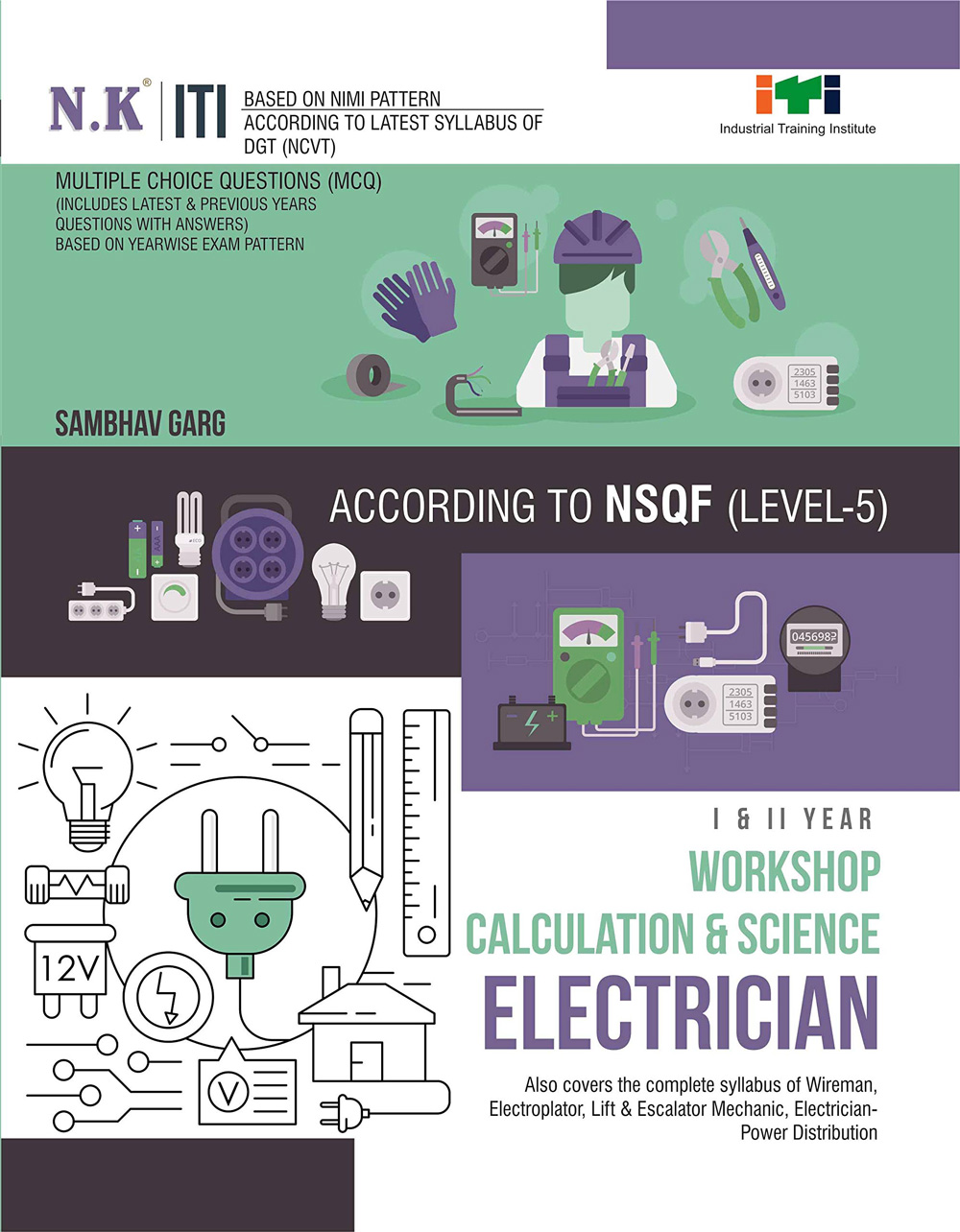Workshop Calculation Science Electrician

ITI Book Workshop Calculation Science Electrician is by Sambhav Garg. Workshop Calculation Science Electrician is according to Latest NSQF Level. Workshop Calculation Science Electrician is according to latest syllabus of DGT(NCVT). Workshop Calculation Science Electrician is for I Year, II Year. Workshop Calculation Science Electrician is for ITI trade Electrician . Workshop Calculation Science Electrician have fundamental topic Units, Fractions, Square Roots, Ratio and Proportion, Percentage, Metals, Mass Weight and Density, Velocity and Speed, Work Power and Energy, Algebra, Mensuration, Trigonometry, Heat and Temperature, Electricity, Simple Machines and Levers, Elasticity, Materials, Magnetism, Pressure, Heat Treatment, Law of Indices, Alternating Current Circuit, Battery, Electrical Power and Energy, Friction, Force, Centre of Gravity, Number System, Electrical Estimate And Costing, Graph, Percentage Interest and Depreciation
Units
- System of Units
- S.I. Units
- Conversion of Units
- S.I. Prefixes and Multiplication Factors
- Quantities and Units
Fractions
- Fractions
- Least Common Multiple (L.C.M.)
- Highest Common Factor (H.C.F.)
- Conversion of Fraction to Decimal and Vice versa
- Scientific Calculation
Square Roots
- Square Root
- Rationalisation
- Simple Calculator
Ratio and Proportion
- Ratio
- Proportion
- Time, Work and Labour Related Problem
- Average
Percentage
- Convert fractional Number into Percentage
- Convert Percentage into Decimal
- Convert Decimal into Percentage
- Simple Calculation
Metals
- Properties of Metals
- Iron
- Types of Metals
- Differences between Ferrous and Non-ferrous Metals
- Non-ferrous Alloys
Mass Weight and Density
- Mass
- Weight
- Differences between Mass and Weight
- Density
- Relative Density
- Laws of Floatation
Velocity and Speed
- Rest and Motion
- Speed
- Velocity
- Differences between Velocity and Speed
- Acceleration
- Retardation
- Newton's Laws of Motion
- Equations of Motion
Work Power and Energy
- Work
- Power
- Horse Power of Engines
- Mechanical Efficiency
- Energy
Algebra
- Rules of Positive and Negative Signs
- Laws of Indices
- Addition and Subtraction of Algebraic Number
- Multiplication and Division of Algebraic Numbers
- Algebraic Formulas
- Factors of Trinomial
- Equations
- Quadratic Equations
Mensuration
- Circle
- Perimeter and Area of Plane Figures
- Volume
- Area and Volume of Spherical Figures
- Area of Solids of Revolution
Trigonometry
- Relation between Sides of Triangle
- Trigonometric Formulae
- Relation between Trigonometric Ratios
- Systems of Measuring Angles
- Trigonometric Values of Some Angles
Heat and Temperature
- Heat
- Temperature
- Boiling Point
- Melting Point
- Differences between Temperature and Heat
- Sources of Heat
- Effects of Heat
- Specific Heat
- Quantity of Heat
- Thermal Capacity
- Water Equivalent of Heat
- Interchange of Heat
- Calorimeter
- Transmission of Heat
- Thermometer
- Pyrometer
- Expansion of Solids
Electricity
- Production of Electricity
- Uses of Electricity
- Types of Electrical Materials According to the Electricity Law
- Electric Current
- Types of Electric Current
- Comparison between A.C. and D.C.
- Ampere
- Electromotive Force
- Electric Voltage
- Potential Difference (P.D.)
- One Volt
- Resistance
- Specific Resistance
- Temperature Coefficient
- Electric Circuit
- Series and Parallel Connections of Resistance
- Electrical Power
- Electrical energy
Simple Machines and Levers
- Effort
- Load
- Mechanical Advantage
- Velocity Ratio
- Efficiency of Machine
- Types of Simple Machines
- Lever
Elasticity
- Production of Electricity
- Uses of Electricity
- Types of Electrical Materials According to the Electricity Law
- Electric Current
- Types of Electric Current
- Comparison between A.C. and D.C.
- Ampere
- Electromotive Force
- Electric Voltage
- Potential Difference (P.D.)
- One Volt
- Resistance
- Specific Resistance
- Temperature Coefficient
- Electric Circuit
- Series and Parallel Connections of Resistance
- Electrical Power
- Electrical energy
Materials
- Classification of Materials
- Classification of Electrical Materials
- Differences between Conductor, Insulator and Semiconductor
- Properties of Materials
Magnetism
- Magnet
- Comparison between Permanent Magnet and Electromagnet
- Methods of Magnetization
- Magnetic Substances
- Magnetic Field
- Important Definitions Related to Magnetism
- Solenoid
- Determination of the Force in Current Carrying Conductor
- Faraday's Law of Electro Magnetic Induction
- Hysteresis
- Eddy Current
Electrician Mechanic Theory I, II Year
- Magnetism and Magnet
- Types of Magnet
- Classification of Magnetic Substances
- Laws of Magnetism
- Magnetic Field
- Important Definitions Related to Magnetism
- Determination of Direction of Magnetic Field of Current Carrying Conductor
- Magnetic Effect of Current in Two Parallel Conductors
- Solenoid
- Significance of Electromagnetism
- Determination of Force In Current Carrying Conductors
- Faraday's Laws of Electromagnetic Induction
- Applications of Electromagnet
- Lifting Power of Magnet
Workshop Calculation And Science [Mechanical]
- Magnetism and Magnet
- Types of Magnet
- Classification of Magnetic Substances
- Laws of Magnetism
- Magnetic Field
- Important Definitions Related to Magnetism
- Determination of Direction of Magnetic Field of Current Carrying Conductor
- Magnetic Effect of Current in Two Parallel Conductors
- Solenoid
- Electromagnet
- Determination of Force in Current Carrying Conductor
- Faraday’s Laws of Electromagnetic Induction
- Methods of Magnetization
- Applications of Electromagnet
- Lifting Power of Magnet
Pressure
- Units of Pressure
- Atmospheric Pressure
- Pressure on a Body Immersed in a Fluid
- Types of Pressure
- Device for Measuring Atmospheric Pressure
- Boyle’s Law
- Charles’s Law
- Gas Equation
- Pascal’s Law
- Pneumatic Pressure
- Pneumatic System
- Hydraulic System
- Mechanical Gauge
Heat Treatment
- Types of Steel Structures
- Structure of Steel when Heated
- Critical Temperature
- Three Stages of Heat Treatment
- Methods of Heat Treatment
Fitter Theory
- Types of Steel Structures
- Structure of Steel when Heated
- Critical Temperature
- Three Stages of Heat Treatment
- Methods of Heat Treatment
- Hardening Method of High Speed Steel
- Various Methods of Hardness Test
Law of Indices
- Square
- Power
- Square Root
- Methods of Solving out the Square Root
- Cube
- Cube Root
- Method of Finding Cube Root
- Rationalization
Alternating Current Circuit
- Inductors
- Capacitor
- Effects of Inductor in an AC Circuit
- Effects of Capacitor in an AC Circuit
- Impedance
- Power Factor
- Power Factor Improvement
- Electric Supply System
- Terminologies Related to Three Phase System
- Winding Connections
Workshop Calculation Science Electrician
- Alternating Current
- Terms Related to Alternating Current
- Speed of Wave
- Pure Resistive Circuit
- Inductor
- Inductance
- Inductive Reactance
- Coefficient of Coupling
- Time Constant of an Inductor
- Capacitance
- Capacitive Reactance
- Time Constant of a Capacitor
- Impedance
- Resonance Frequency
- Circuit Q Factor
- Polyphase
- Combination of Resistors
- Series and Parallel Combination of Capacitor
- Series and Parallel Combination of Inductor
- Power Factor
- Important Formulae Related to Calculations for AC Circuits
Battery
- Internal Resistance of the Cell
- Connection of Cells
- Battery Charging
Electrical Power and Energy
- Electrical Power
- Electrical Energy
Friction
- Types of Friction
- Normal Reaction
- Limiting Friction
- Laws of Friction
- Coefficient of Friction
- Angle of Friction
- Inclined Plane
- Force of Friction when the Applied Force is in Horizontal Direction
- Force of Friction when the Force is Inclined at an Angle q with the Horizontal
- Applications and Effects of Friction
- Lubrication
Force
- Representation of Force
- Parallel Forces
- Resultant Force
- Representation of Forces
- Parallelogram Law of Forces
- Triangle Law of Forces
- Lami's Theorem
- Resolution of Forces
- Linear Motion
- Circular Motion
- Centrifugal Force
- Centripetal Force
- Angular Displacement
- Angular Velocity
- Angular Acceleration
Workshop Calculation Science Electrician
- Parallel Forces
- Resultant Forces
- Types of Quantities
- Representation of Forces
- Composition of Forces
- Resolution of Forces
- Condition for Equilibrium of Forces Acting on a Body
- Parallelogram Law of Forces
- Law of Triangle of Forces
- Lami’s Theorem
- Jib Crane
Centre of Gravity
- Gravitational Acceleration
- Centre of Gravity
- Centre of Gravity of Symmetric Body
- Determination of Centre of Gravity for Non-symmetric Objects
- Determination of Centre of Gravity through Calculation
- Conditions of Equilibrium
- Types of Equilibrium
Number System
- Conversion of Decimal Number System to Binary Number System
- Conversion of Binary Number System to Decimal Number System
- Conversion of Decimal Number System to Octal Number System
- Conversion of Octal Number System to Decimal Number System
- Conversion of Decimal Number System to Hexadecimal Number System
- Conversion of Hexadecimal Number System to Decimal Number System
- Conversion of Binary Number System to Octal Number System
- Conversion of Octal Number System to Hexadecimal Number System
- Conversion of Binary Number System to Hexadecimal Number System
- Conversion of Hexadecimal Number System to Binary Number System
- Comparison of Decimal, Binary, Hexadecimal and Octal Number
Electrical Estimate And Costing
- Estimate for Internal Electric Wiring
- Calculation of Load for Domestic Wiring and Selection of Cable/Wire
- Calculation of Conductor Size for Domestic Internal Wiring
- Load Calculation with Diversity Factor
- Selection of a Cable with Permissible Voltage Drop
- Preparation of List of Materials and Estimate Cost of Electrical Wiring
Graph
- Main Points to Draw a Graph
- Solution by Graph
- Equation with Two Variables
- Equation with Two Constants
- Pie and Bar Graph
Percentage Interest and Depreciation
- Percentage
- Changing a Fraction into Percent
- Loss and Profit
- Discount
- Simple Interest
- Compound Interest
ITI Book Workshop Calculation Science Electrician is by Sambhav Garg. Workshop Calculation Science Electrician is according to Latest NSQF Level. Workshop Calculation Science Electrician is according to latest syllabus of DGT(NCVT). Workshop Calculation Science Electrician is for I Year, II Year. Workshop Calculation Science Electrician is for ITI trade Electrician . Workshop Calculation Science Electrician have fundamental topic Units, Fractions, Square Roots, Ratio and Proportion, Percentage, Metals, Mass Weight and Density, Velocity and Speed, Work Power and Energy, Algebra, Mensuration, Trigonometry, Heat and Temperature, Electricity, Simple Machines and Levers, Elasticity, Materials, Magnetism, Pressure, Heat Treatment, Law of Indices, Alternating Current Circuit, Battery, Electrical Power and Energy, Friction, Force, Centre of Gravity, Number System, Electrical Estimate And Costing, Graph, Percentage Interest and Depreciation
Electrician

ITI trade Electrician is powered by NCVT. ITI trade Electrician is a job oriented trade ITI trade Electrician is suitable for government job and private job. This ITI trade Electrician is very powerful for self-empowerment. This ITI trade Electrician is perfectly design to fulfill industrial requirement of Indian Industries as well as International industries.
- Electricians have a wide scope of Employability ranging from self-employment, contractual employment to Industrial jobs.
- After successful completion of this course, Electricians can aspire to become Electrical Contractors by acquiring the ‘B” licence from the Electrical Licence Board.
- They can set up their own Rewinding and servicing of Domestic Equipment shop.
- Job opportunities are wide open in Defence, Railways, Transport, Ship Building, Electricity Board, various Industries etc
- They can also go for further higher studies after successful completion of course.
- Students who have completed this course have found employment in the following areas:
- Service/Maintenance Technician for domestic appliances in Reputed Companies
- Winder of Electrical Motors in winding shop
- Contractor for domestic wiring and industrial wiring
- Armature winder of Electrical fans and motors
- Electrical appliance repair in electrical shops
- Indian Railway (Asst. Driver, Tech. Gr. III, Appr. Technician)
- Local Electricity Board
- Assembler of Electrical control Gears
- Telephone Department
- Installation and Testing division of Auditorium and Cinema Hall
- Factories
- As Instructor in Govt./Private ITI/ITC
- Merchant Navy
- Indian Air Force
- Self-Employment in Service Centre
Neelkanth Publishers

Welcome to Neelkanth Publishers or NK as it is popularly known. In the last ten years, we have published more than 1100 titles and editions of text books, solved question papers in different segments including Engineering, ITI,Polytechnic and Skill Development. We believe in making quality books which are easy to understand, have lucid language and have simple and attractive illustrations. Our authors include some of the most well-known names in their respective fields. Though are books are prepared after painstaking and extensive research with numerous revisions for language and content, yet they are affordable for the masses and hence are popular in the entire country.
https://neelkanthpublishers.com/
ITI text and hand books
Units
System of Units
S.I. Units
Conversion of Units
S.I. Prefixes and Multiplication Factors
Quantities and Units
Fractions
Fractions
Least Common Multiple (L.C.M.)
Highest Common Factor (H.C.F.)
Conversion of Fraction to Decimal and Vice versa
Scientific Calculation
Square Roots
Square Root
Rationalisation
Simple Calculator
Ratio and Proportion
Ratio
Proportion
Time, Work and Labour Related Problem
Average
Percentage
Convert fractional Number into Percentage
Convert Percentage into Decimal
Convert Decimal into Percentage
Simple Calculation
Metals
Properties of Metals
Iron
Types of Metals
Differences between Ferrous and Non-ferrous Metals
Non-ferrous Alloys
Mass, Weight and Density
Mass
Weight
Differences between Mass and Weight
Density
Relative Density
Laws of Floatation
Velocity and Speed
Rest and Motion
Speed
Velocity
Differences between Velocity and Speed
Acceleration
Retardation
Newton's Laws of Motion
Equations of Motion
Work, Power and Energy
Work
Power
Horse Power of Engines
Mechanical Efficiency
Energy
Algebra
Rules of Positive and Negative Signs
Laws of Indices
Addition and Subtraction of Algebraic Number
Multiplication and Division of Algebraic Numbers
Algebraic Formulas
Factors of Trinomial
Equations
Quadratic Equations
Mensuration
Circle
Perimeter and Area of Plane Figures
Volume
Area and Volume of Spherical Figures
Area of Solids of Revolution
Trigonometry
Relation between Sides of Triangle
Trigonometric Formulae
Relation between Trigonometric Ratios
Systems of Measuring Angles
Trigonometric Values of Some Angles
Heat and Temperature
Heat
Temperature
Boiling Point
Melting Point
Differences between Temperature and Heat
Sources of Heat
Effects of Heat
Specific Heat
Quantity of Heat
Thermal Capacity
Water Equivalent of Heat
Interchange of Heat
Calorimeter
Transmission of Heat
Thermometer
Pyrometer
Expansion of Solids
Electricity
Production of Electricity
Uses of Electricity
Types of Electrical Materials According to the Electricity Law
Electric Current
Types of Electric Current
Comparison between A.C. and D.C.
Ampere
Electromotive Force
Electric Voltage
Potential Difference (P.D.)
One Volt
Resistance
Specific Resistance
Temperature Coefficient
Electric Circuit
Series and Parallel Connections of Resistance
Electrical Power
Electrical energy
Simple Machines and Levers
Effort
Load
Mechanical Advantage
Velocity Ratio
Efficiency of Machine
Types of Simple Machines
Lever
Elasticity
Elasticity
Plasticity
Stress
Strain
Different Types of stresses
Hooke’s Law
Elastic Limit
Ultimate Stress
Working Stress
Factor of Safety
Stress-strain Curve
Young’s Modulus/Modulus of Elasticity
Modulus of Rigidity
Poisson’s Ratio
Bulk Modulus
Relationship between Modulus for a Given Material
Materials
Classification of Materials
Classification of Electrical Materials
Differences between Conductor, Insulator and Semiconductor
Properties of Materials
Magnetism
Magnetism and Magnet
Types of Magnet
Classification of Magnetic Substances
Laws of Magnetism
Magnetic Field
Important Definitions Related to Magnetism
Determination of Direction of Magnetic Field of Current Carrying Conductor
Magnetic Effect of Current in Two Parallel Conductors
Solenoid
Electromagnet
Determination of Force in Current Carrying Conductor
Faraday’s Laws of Electromagnetic Induction
Applications of Electromagnet
Lifting Power of Magnet
Pressure
Units of Pressure
Pneumatic Pressure
Atmospheric Pressure
Pressure on Body Immersed in a Fluid
Types of Pressure
Device for Measuring Atmospheric Pressure
Boyle’s Law
Charles’ Law
Gas Equation
Pascal’s Law
Heat Treatment
Critical Temperature
Three Stages of Heat Treatment
Methods of Heat Treatment
Law of Indices
Square
Power
Square Root
Methods of Solving out the Square Root
Cube
Cube Root
Method of Finding Cube Root
Rationalization
Alternating Current Circuit
Alternating Current
Terms Related to Alternating Current
Speed of Wave
Pure Resistive Circuit
Inductor
Inductance
Inductive Reactance
Coefficient of Coupling
Time Constant of an Inductor
Capacitance
Capacitive Reactance
Time Constant of a Capacitor
Impedance
Resonance Frequency
Circuit Q Factor
Polyphase
Combination of Resistors
Series and Parallel Combination of Capacitor
Series and Parallel Combination of Inductor
Power Factor
Important Formulae Related to Calculations for AC Circuits
Battery
Internal Resistance of the Cell
Connection of Cells
Battery Charging
Electrical Power and Energy
Electrical Power
Electrical Energy
Friction
Types of Friction
Normal Reaction
Limiting Friction
Laws of Friction
Coefficient of Friction
Angle of Friction
Inclined Plane
Force of Friction when the Applied force is in Horizontal Direction
Force of Friction when the Force is Inclined at an Angle q with the Horizontal
Lubrication
Force
Representation of Force
Parallel Forces
Resultant Forces
Types of Quantities
Representation of Forces
Composition of Forces
Resolution of Forces
Condition for Equilibrium of Forces Acting on a Body
Parallelogram Law of Forces
Law of Triangle of Forces
Lami’s Theorem
Jib Crane
Centre of Gravity
Gravitational Acceleration
Centre of Gravity
Examples of Centre of Gravity of Symmetric Body
Determination of Centre of Gravity for Non-symmetric Objects
Determination of Centre of Gravity Through Calculation
Condition of Equilibrium
Types of Equilibrium
Centrifugal Force
Number System
Conversion of Decimal Number System to Binary Number System
Conversion of Binary Number System to Decimal Number System
Conversion of Decimal Number System to Octal Number System
Conversion of Octal Number System to Decimal Number System
Conversion of Decimal Number System to Hexadecimal Number System
Conversion of Hexadecimal Number System to Decimal Number System
Conversion of Binary Number System to Octal Number System
Conversion of Octal Number System to Hexadecimal Number System
Conversion of Binary Number System to Hexadecimal Number System
Conversion of Hexadecimal Number System to Binary Number System
Comparison of Decimal, Binary, Hexadecimal and Octal Number
Electrical Estimate And Costing
Estimate for Internal Electric Wiring
Calculation of Load for Domestic Wiring and Selection of Cable/Wire
Calculation of Conductor Size for Domestic Internal Wiring
Load Calculation with Diversity Factor
Selection of a Cable with Permissible Voltage Drop
Preparation of List of Materials and Estimate Cost of Electrical Wiring
Graph
Main Points to Draw a Graph
Solution by Graph
Equation of Two Variables
Equation with Two Constants
Percentage, Interest and Depreciation
Percentage
Changing a Fraction into Percent
Loss and Profit
Discount
Simple Interest
Compound Interest

